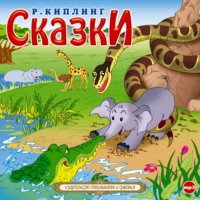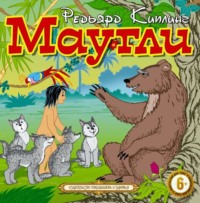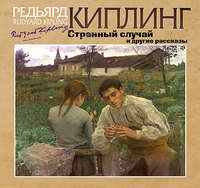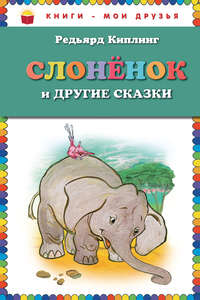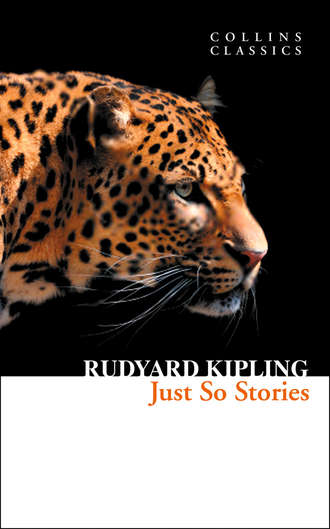
Полная версия
Just So Stories
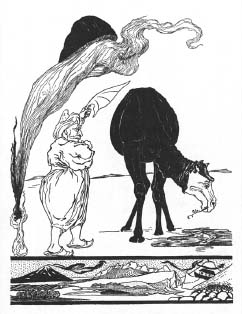
‘Does he say anything else?’
‘Only “Humph!”; and he won’t plough,’ said the Ox.
‘Very good,’ said the Djinn. ‘I’ll humph him if you will kindly wait a minute.’
The Djinn rolled himself up in his dustcloak, and took a bearing across the desert, and found the Camel most ’scruciatingly idle, looking at his own reflection in a pool of water.
‘My long and bubbling friend,’ said the Djinn, ‘what’s this I hear of your doing no work, with the world so new-and-all?’
‘Humph!’ said the Camel.
The Djinn sat down, with his chin in his hand, and began to think a Great Magic, while the Camel looked at his own reflection in the pool of water.
‘You’ve given the Three extra work ever since Monday morning, all on account of your ’scruciating idleness,’ said the Djinn; and he went on thinking Magics, with his chin in his hand.
‘Humph!’ said the Camel.
‘I shouldn’t say that again if I were you,’ said the Djinn; ‘you might say it once too often. Bubbles, I want you to work.’
And the Camel said ‘Humph!’ again; but no sooner had he said it than he saw his back, that he was so proud of, puffing up and puffing up into a great big lolloping humph.
‘Do you see that?’ said the Djinn. ‘That’s your very own humph that you’ve brought upon your very own self by not working. To-day is Thursday, and you’ve done no work since Monday, when the work began. Now you are going to work.’
‘How can I,’ said the Camel, ‘with this humph on my back?’
‘That’s made a-purpose,’ said the Djinn, ‘all because you missed those three days. You will be able to work now for three days without eating, because you can live on your humph; and don’t you ever say I never did anything for you. Come out of the Desert and go to the Three, and behave. Humph yourself!’
And the Camel humphed himself, humph and all, and went away to join the Three. And from that day to this the Camel always a wears a humph (we call it ‘hump’ now, not to hurt his feelings); but he has never yet caught up with the three days that he missed at the beginning of the world, and he has never yet learned how to behave.
THE Camel’s hump is an ugly lump
Which well you may see at the Zoo;
But uglier yet is the hump we get
From having too little to do.
Kiddies and grown-ups too-oo-oo,
If we haven’t enough to do-oo-oo,
We get the hump –
Cameelious hump –
The hump that is black and blue!
We climb out of bed with a frouzly head
And a snarly-yarly voice.
We shiver and scowl and we grunt and we growl
At our bath and our boots and our toys;
And there ought to be a corner for me
(And I know there is one for you)
When we get the hump –
Cameelious hump –
The hump that is black and blue!
The cure for this ill is not to sit still,
Or frowst with a book by the fire;
But to take a large hoe and a shovel also,
And dig till you gently perspire;
And then you will find that the sun and the wind,
And the Djinn of the Garden too,
Have lifted the hump –
The horrible hump –
The hump that is black and blue!
I get it as well as you-oo-oo –
If I haven’t enough to do-oo-oo!
We all get the hump –
Cameelious hump –
Kiddies and grown-ups too!
How the Rhinoceros Got His Skin
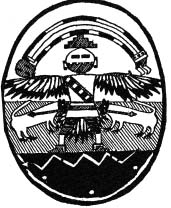
Once upon a time, on an uninhabited island on the shores of the Red Sea, there lived a Parsee from whose hat the rays of the sun were reflected in more-than-oriental splendour. And the Parsee lived by the Red Sea with nothing but his hat and his knife and a cooking-stove of the kind that you must particularly never touch. And one day he took flour and water and currants and plums and sugar and things, and made himself one cake which was two feet across and three feet thick. It was indeed a Superior Comestible (that’s Magic), and he put it on the stove because he was allowed to cook on that stove, and he baked it and he baked it till it was all done brown and smelt most sentimental. But just as he was going to eat it there came down to the beach from the Altogether Uninhabited Interior one Rhinoceros with a horn on his nose, two piggy eyes, and few manners. In those days the Rhinoceros’s skin fitted him quite tight. There were no wrinkles in it anywhere. He looked exactly like a Noah’s Ark Rhinoceros, but of course much bigger. All the same, he had no manners then, and he has no manners now, and he never will have any manners. He said, ‘How!’ and the Parsee left that cake and climbed to the top of a palm-tree with nothing on but his hat, from which the rays of the sun were always reflected in more-than-oriental splendour. And the Rhinoceros upset the oil-stove with his nose, and the cake rolled on the sand, and he spiked that cake on the horn of his nose, and he ate it, and he went away, waving his tail, to the desolate and Exclusively Uninhabited Interior which abuts on the islands of Mazanderan, Socotra, and the Promontories of the Larger Equinox. Then the Parsee came down from his palm-tree and put the stove on its legs and recited the following Sloka, which, as you have not heard, I will now proceed to relate: –
Them that takes cakes
Which the Parsee-man bakes
Makes dreadful mistakes.
And there was a great deal more in that than you would think.
Because, five weeks later, there was a heat-wave in the Red Sea, and everybody took off all the clothes they had. The Parsee took off his hat; but the Rhinoceros took off his skin and carried it over his shoulder as he came down to the beach to bathe. In those days it buttoned underneath with three buttons and looked like a waterproof. He said nothing whatever about the Parsee’s cake, because he had eaten it all; and he never had any manners, then, since, or henceforward. He waddled straight into the water and blew bubbles through his nose, leaving his skin on the beach.
Presently the Parsee came by and found the skin, and he smiled one smile that ran all round his face two times. Then he danced three times round the skin and rubbed his hands. Then he went to his camp and filled his hat with cake-crumbs, for the Parsee never ate anything but cake, and never swept out his camp. He took that skin, and he shook that skin, and he scrubbed that skin, and he rubbed that skin just as full of old, dry, stale, tickly cake-crumbs and some burned currants as ever it could possibly hold. Then he climbed to the top of his palm-tree and waited for the Rhinoceros to come out of the water and put it on.
And the Rhinoceros did. He buttoned it up with the three buttons, and it tickled like cake-crumbs in bed. Then he wanted to scratch, but that made it worse; and then he lay down on the sands and rolled and rolled and rolled, and every time he rolled the cake-crumbs tickled him worse and worse and worse. Then he ran to the palm-tree and rubbed and rubbed and rubbed himself against it. He rubbed so much and so hard that he rubbed his skin into a great fold over his shoulders, and another fold underneath, where the buttons used to be (but he rubbed the buttons off), and he rubbed some more folds over his legs. And it spoiled his temper, but it didn’t make the least difference to the cake-crumbs. They were inside his skin and they tickled. So he went home, very angry indeed and horribly scratchy; and from that day to this every rhinoceros has great folds in his skin and a very bad temper, all on account of the cake-crumbs inside.
But the Parsee came down from his palm-tree, wearing his hat, from which the rays of the sun were reflected in more-than-oriental splendour, packed up his cooking-stove, and went away in the direction of Orotavo, Amygdala, the Upland Meadows of Anantarivo, and the Marshes of Sonaput.
This is the picture of the Parsee beginning to eat his cake on the Uninhabited Island in the Red Sea on a very hot day; and of the Rhinoceros coming down from the Altogether Uninhabited Interior, which, as you can truthfully see, is all rocky. The Rhinoceros’s skin is quite smooth, and the three buttons that button it up are underneath, so you can’t see them. The squiggly things on the Parsee’s hat are the rays of the sun reflected in more-than-oriental splendour, because if I had drawn real rays they would have filled up all the picture. The cake has currants in it; and the wheel-thing lying on the sand in front belonged to one of Pharaoh’s chariots when he tried to cross the Red Sea. The Parsee found it, and kept it to play with. The Parsee’s name was Pestonjee Bomonjee, and the Rhinoceros was called Strorks, because he breathed through his mouth instead of his nose. I wouldn’t ask anything about the cooking-stove if I were you.
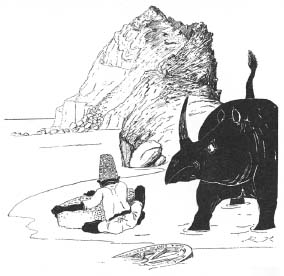
This is the Parsee Pestonjee Bomonjee sitting in hispalm-tree and watching the Rhinoceros Strorks bathing near the beach of the Altogether Uninhabited Island after Strorks had taken off his skin. The Parsee has rubbed the cake-crumbs into the skin, and he is smiling to think how they will tickle Strorks when Strorks puts it on again. The skin is just under the rocks below the palm-tree in a cool place; that is why you can’t see it. The Parsee is wearing a new more-than-oriental-splendour hat of the sort that Parsees wear; and he has a knife in his hand to cut his name on palm-trees. The black things on the islands out at sea are bits of ships that got wrecked going down the Red Sea; but all the passengers were saved and went home.
The black thing in the water close to the shore is not a wreck at all. It is Strorks the Rhinoceros bathing without his skin. He was just as black underneath his skin as he was outside. I wouldn’t ask anything about the cooking-stove if I were you.
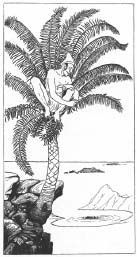
THIS Uninhabited Island
Is off Cape Gardafui,
By the Beaches of Socotra
And the Pink Arabian Sea:
But it’s hot – too hot from Suez
For the likes of you and me
Ever to go
In a P. and O.
And call on the Cake-Parsee!
How the Leopard Got His Spots

In the days when everybody started fair, Best Beloved, the Leopard lived in a place called the High Veldt. ’Member it wasn’t the Low Veldt, or the Bush Veldt, or the Sour Veldt, but the ’sclusively bare, hot, shiny High Veldt, where there was sand and sandy-coloured rock and ’sclusively tufts of sandy-yellowish grass. The Giraffe and the Zebra and the Eland and the Koodoo and the Hartebeest lived there; and they were ’sclusively sandy-yellow-brownish all over; but the Leopard, he was the ’sclusivest sandiest-yellowest-brownest of them all – a greyish-yellowish catty-shaped kind of beast, and he matched the ’sclusively yellowish-greyish-brownish colour of the High Veldt to one hair. This was very bad for the Giraffe and the Zebra and the rest of them; for he would lie down by a ’sclusively yellowish-greyish-brownish stone or clump of grass, and when the Giraffe or the Zebra or the Eland or the Koodoo or the Bush-Buck or the Bonte-Buck came by he would surprise them out of their jumpsome lives. He would indeed! And, also, there was an Ethiopian with bows and arrows (a ’sclusively greyish-brownish-yellowish man he was then), who lived on the High Veldt with the Leopard; and the two used to hunt together – the Ethiopian with his bows and arrows, and the Leopard ’sclusively with his teeth and claws – till the Giraffe and the Eland and the Koodoo and the Quagga and all the rest of them didn’t know which way to jump, Best Beloved. They didn’t indeed!
After a long time – things lived for ever so long in those days – they learned to avoid anything that looked like a Leopard or an Ethiopian; and bit by bit – the Giraffe began it, because his legs were the longest – they went away from the High Veldt. They scuttled for days and days and days till they came to a great forest, ’sclusively full of trees and bushes and stripy, speckly, patchy-blatchy shadows, and there they hid: and after another long time, what with standing half in the shade and half out of it, and what with the slippery-slidy shadows of the trees falling on them, the Giraffe grew blotchy, and the Zebra grew stripy, and the Eland the the Koodoo grew darker, with little wavy grey lines on their backs like bark on a tree trunk; and so, though you could hear them and smell them, you could very seldom see them, and then only when you knew precisely where to look. They had a beautiful time in the ’sclusively speckly-spickly shadows of the forest, while the Leopard and the Ethiopian ran about over the ’sclusively greyish-yellowish-reddish High Veldt outside, wondering where all their breakfasts and their dinners and their teas had gone. At last they were so hungry that they ate rats and beetles and rock-rabbits, the Leopard and the Ethiopian, and then they had the Big Tummy-ache, both together; and then they met Baviaan – the dog-headed, barking Baboon, who is Quite the Wisest Animal in All South Africa.
This is Wise Baviaan, the dog-headed Baboon, who is Quite the Wisest Animal in All South Africa. I have drawn him from a statue that I made up out of my own head, and I have written his name on his belt and on his shoulder and on the thing he is sitting on. I have written it in what is not called Coptic and Hieroglyphic and Cuneiformic and Bengalic and Burmic and Hebric, all because he is so wise. He is not beautiful, but he is very wise; and I should like to paint him with paint-box colours, but I am not allowed. The umbrella-ish thing about his head is his Conventional Mane.
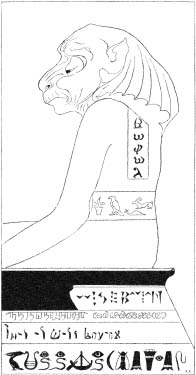
Said Leopard to Baviaan (and it was a very hot day), ‘Where has all the game gone?’
And Baviaan winked. He knew.
Said the Ethiopian to Baviaan, ‘Can you tell me the present habitat of the aboriginal Fauna?’ (That meant just the same thing, but the Ethiopian always used long words. He was a grown-up.)
And Baviaan winked. He knew.
Then said Baviaan, ‘The game has gone into other spots; and my advice to you, Leopard, is to go into other spots as soon as you can.’
And the Ethiopian said, ‘That’s is all very fine, but I wish to know whither the aboriginal Fauna has migrated.’
Then said Baviaan, ‘The aboriginal Fauna has joined the aboriginal Flora because it was high time for a change; and my advice to you, Ethiopian, is to change as soon as you can.’
That puzzled the Leopard and the Ethiopian, but they set off to look for the aboriginal Flora, and presently, after ever so many days, they saw a great, high, tall forest full of tree trunks all ’sclusively speckled and sprottled and spottled, dotted and splashed and slashed and hatched and cross-hatched with shadows. (Say that quickly aloud, and you will see how very shadowy the forest must have been.)
‘What is this,’ said the Leopard, ‘that is so ’sclusively dark, and yet so full of little pieces of light?’
‘I don’t know,’ said the Ethiopian, ‘but it ought to be the aboriginal Flora. I can smell Giraffe, and I can hear Giraffe, but I can’t see Giraffe.’
‘That’s curious,’ said the Leopard. ‘I suppose it is because we have just come in out of the sunshine. I can smell Zebra, and I can hear Zebra, but I can’t see Zebra.’
‘Wait a bit,’ said the Ethiopian. ‘It’s a long time since we’ve hunted ’em. Perhaps we’ve forgotten what they were like.’
‘Fiddle!’ said the Leopard. ‘I remember them perfectly on the High Veldt, especially their marrow-bones. Giraffe is about seventeen feet high, of a ’sclusively fulvous golden-yellow from head to heel; and Zebra is about four and a half feet high, of a ’sclusively grey-fawn colour from head to heel.’
‘Umm,’ said the Ethiopian, looking into the speckly-spickly shadows of the aboriginal Flora-forest. ‘Then they ought to show up in this dark place like ripe bananas in a smoke-house.’
But they didn’t. The Leopard and the Ethiopian hunted all day; and though they could smell them and hear them, they never saw one of them.
‘For goodness’ sake,’ said the Leopard at tea-time, ‘let us wait till it gets dark. This daylight hunting is a perfect scandal.’
So they waited till dark, and then the Leopard heard something breathing sniffily in the starlight that fell all stripy through the branches, and he jumped at the noise, and it smelt like Zebra, and it felt like Zebra, and when he knocked it down it kicked like Zebra, but he couldn’t see it. So he said, ‘Be quiet, O you person without any form. I am going to sit on your head till morning, because there is something about you that I don’t understand.’
Presently he heard a grunt and a crash and a scramble, and the Ethiopian called out, ‘I’ve caught a thing that I can’t see. It smells like Giraffe, and it kicks like Giraffe, but it hasn’t any form.’
‘Don’t you trust it,’ said the Leopard. ‘Sit on its head till the morning – same as me. They haven’t any form – any of ’em.’
So they sat down on them hard till bright morning-time, and then Leopard said, ‘What have you at your end of the table, Brother?’
The Ethiopian scratched his head and said, ‘It ought to be ’sclusively a rich fulvous orange-tawny from head to heel, and it ought to be Giraffe; but it is covered all over with chestnut blotches. What have you at your end of the table, Brother?’
And the Leopard scratched his head and said, ‘It ought to be ’sclusively a delicate greyish-fawn, and it ought to be Zebra; but it is covered all over with black and purple stripes. What in the world have you been doing to yourself, Zebra? Don’t you know that if you were on the High Veldt I could see you ten miles off? You haven’t any form.’
‘Yes,’ said the Zebra, ‘but this isn’t the High Veldt. Can’t you see?’
‘I can now,’ said the Leopard. ‘But I couldn’t all yesterday. How is it done?’
‘Let us up,’ said the Zebra, ‘and we will show you.’
They let the Zebra and the Giraffe get up; and Zebra moved away to some little thorn-bushes where the sunlight fell all stripy, and Giraffe moved off to some tallish trees where the shadows fell all blotchy.
‘Now watch,’ said the Zebra and the Giraffe. ‘This is the way it’s done. One – two – three! And where’s your breakfast?’
Leopard stared, and Ethiopian stared, but all they could see were stripy shadows and blotched shadows in the forest, but never a sign of Zebra and Giraffe. They had just walked off and hidden themselves in the shadowy forest.
‘Hi! Hi!’ said the Ethiopian. ‘That’s a trick worth learning. Take a lesson by it, Leopard. You show up in this dark place like a bar of soap in a coal-scuttle.’
‘Ho! Ho!’ said the Leopard. ‘Would it surprise you very much to know that you show up in this dark place like a mustard-plaster on a sack of coals?’
‘Well, calling names won’t catch dinner,’ said the Ethiopian. ‘The long and the little of it is that we don’t match our backgrounds. I’m going to take Baviaan’s advice. He told me I ought to change; and as I’ve nothing to change except my skin I’m going to change that.’
‘What to?’ said the Leopard, tremendously excited.
‘To a nice working blackish-brownish colour, with a little purple in it, and touches of slaty-blue. It will be the very thing for hiding in hollows and behind trees.’
So he changed his skin then and there, and the Leopard was more excited than ever; he had never seen a man change his skin before.
‘But what about me?’ he said, when the Ethiopian had worked his last little finger into his fine new black skin.
‘You take Baviaan’s advice too. He told you to go into spots.’
‘So I did,’ said the Leopard. ‘I went into other spots as fast as I could. I went into this spot with you, and a lot of good it has done me.’
‘Oh,’ said the Ethiopian, ‘Baviaan didn’t mean spots in South Africa. He meant spots on your skin.’
‘What’s the use of that?’ said the Leopard.
‘Think of Giraffe,’ said the Ethiopian. ‘Or if you prefer stripes, think of Zebra. They find their spots and stripes give them per-fect satisfaction.’
‘Umm,’ said the Leopard. ‘I wouldn’t look like Zebra – not for ever so.’
‘Well, make up your mind,’ said the Ethiopian, ‘because I’d hate to go hunting without you, but I must if you insist on looking like a sun-flower against a tarred fence.’
‘I’ll take spots, then,’ said the Leopard; ‘but don’t make ’em too vulgar-big. I wouldn’t look like Giraffe – not for ever so.’
‘I’ll make ’em with the tips of my fingers,’ said the Ethiopian. ‘There’s plenty of black left on my skin still. Stand over!’
Then the Ethiopian put his five fingers close together (there was plenty of black left on his new skin still) and pressed them all over the Leopard, and wherever the five fingers touched they left five little black marks, all close together. You can see them on any Leopard’s skin you like, Best Beloved. Sometimes the fingers slipped and the marks got a little blurred; but if you look closely at any Leopard now you will see that there are always five spots – off five fat black finger-tips.
‘Now you are a beauty!’ said the Ethiopian. ‘You can lie out on the bare ground and look like a heap of pebbles. You can lie out on the naked rocks and look like a piece of pudding-stone. You can lie out on a leafy branch and look like sunshine sifting through the leaves; and you can lie right across the centre of a path and look like nothing in particular. Think of that and purr!’
‘But if I’m all this,’ said the Leopard, ‘why didn’t you go spotty too?’
‘Oh, plain black’s best for a nigger,’ said the Ethiopian. ‘Now come along and we’ll see if we can’t get even with Mr One-Two-Three-Where’s-your-Breakfast!’
So they went away and lived happily ever afterward, Best Beloved. That is all.
Oh, now and then you will hear grown-ups say, ‘Can the Ethiopian change his skin or the Leopard his spots?’ I don’t think even grown-ups would keep on saying such a silly thing if the Leopard and the Ethiopian hadn’t done it once – do you? But they will never do it again, Best Beloved. They are quite contented as they are.
I AM the Most Wise Baviaan, saying in most wise tones,
‘Let us melt into the landscape – just us two by our lones.’
People have come – in a carriage – calling.
But Mummy is there ...
Yes, I can go if you take me – Nurse says she don’t care.
Let’s go up to the pig-sties and sit on the farmyard rails!
Let’s say things to the bunnies, and watch ’em skitter their tails!
Let’s – oh, anything, daddy, so long as it’s you and me,
And going truly exploring, and not being in till tea!
Here’s your boots (I’ve brought ’em), and here’s your cap and stick,
And here’s your pipe and tobacco. Oh, come along out of it – quick!
This is the picture of the Leopard and Ethiopian after they had taken Wise Baviaan’s advice and the Leopard had gone into other spots and the Ethiopian had changed his skin. The Ethiopian was really a negro, and so his name was Sambo. The Leopard was called Spots, and he has been called Spots ever since. They are out hunting in the spickly-speckly forest, and they are looking for Mr One-Two-Three-Where’s-your-Breakfast. If you look a little you will see Mr One-Two-Three not far away. The Ethiopian has hidden behind a splotchy-blotchy tree because it matches his skin, and the Leopard is lying beside a spickly-speckly bank of stones because it matches his spots. Mr One-Two-Three-Where’s-your-Breakfast is standing up eating leaves from a tall tree. This is really a puzzle-picture like ‘Find-the-Cat.’



